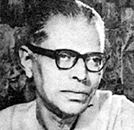Mallick, Pankaj Kumar
Mallick, Pankaj Kumar (1905-1978) artist of Rabindra Sangeet or tagore songs, composer and music director was born in a Vaishnava family of Kolkata on 10 May 1905. He had a passion for music since childhood. After matriculating in 1921, he took admission in Bangabasi College, but soon dropped out. Pankaj Kumar started learning music early in life from one of his relatives.

At college, he devoted himself almost wholly to music and started performing at festivals and other functions. At one such function he met Durgadas Bandyopadhyay, a famous singer of his time. Durgadas saw great promise in Pankaj and began giving him lessons in classical music. Pankaj Kumar also became attracted to Tagore songs and started setting tunes to one or two poems of Tagore. He later learnt tagore songs under Dinendranath Thakur.
Pankaj Kumar introduced changes in the tradition of Tagore songs, such as the use of the tabla. He also infused new life into Tagore songs by rendering them with his bold, manly voice and passionate feeling. He earned considerable fame by setting many of Tagore’s poems to music and recording them as songs. His recorded songs number more than 400. His first record was released by Vielophone in 1926. This was followed by records released by a number of other companies.
His last recording of Tagore songs was released in 1961, to mark the birth centenary of the poet. The last recording of his life was a recitation of Sanskrit hymns in 1970.
Pankaj Kumar worked with the Kolkata radio station for about half a century, from 1927 to 1975. He directed various music programmes. When the station started a music teaching programme, Pankaj Kumar directed it and gave lessons for a considerable period of time. Along with Tagore songs, he also taught nazrul songs in this programme. Pankaj Kumar also helped launch a musical feature, Mahisasuramardini, in 1929 to celebrate durga puja. His music direction in the programme was hailed as the work of a genius.
Pankaj Kumar became adviser to Lokaranjan Shakha (public entertainment branch) of the West Bengal government in 1953 at the request of Chief Minister Dr bidhan chandra ray. He served in this capacity till 1967. He presided over the music sessions of the Nikhil Bharat Banga Sahitya Sammelan in 1953 and 1956.
Pankaj Kumar sang in more than a hundred films, helping to introduce playback singing in Indian films. Apart from singing, he also directed the music of more than fifty Bangla and Hindi films. In the era of silent films, he became famous playing orchestra music for Chasar Meye. He also directed music for stage plays, starting with Saurindramohan Mukhopadhyay's Svayamvar in 1930. Pankaj Kumar acted in a film called Mukti. He composed the music for the special programme aired by the Kolkata radio station to mark the independence of India on 14 August 1947.
Pankaj Kumar also made valued contributions to the study of music. He gave several lectures on music at various seminars. His three significant lectures at a seminar organised by the Delhi Music and Drama Academy were 'Influence of North Indian Music in the Evolution of Music in Bengali Motion Picture' (1950), 'Wealth of Indian Classical and Folk Music and Its Place in Films' (1954) and 'Is Popular Music Devoid of Classical Music' (1956). In 1957, he delivered a lecture on 'A Short Account of My Experience with AIR since Its Inception in Calcutta in 1927' at the 30th anniversary celebration of the Delhi centre of Akash Vani. The same year he delivered a lecture on the practical and theoretical forms of music at the Banga Sahitya Sammelan at Bhagalpur.
Although Pankaj Kumar showed his genius in various branches of music - kirtan, bhajan, folk songs, patriotic songs, shyamasangit, and Hindi songs - he is mainly remembered for his Tagore songs. He was regarded as an institution in Tagore songs because of his ceaseless devotion, and bold initiatives. He received awards from many organisations for his musical talent: 'Sursagar' by Sarasvata Mahamandal in 1932, 'Sangitratnakar' in 1956, 'Padmashri' by the Indian government in 1970, 'Dada Saheb Phalke' in 1973 and 'Rabindratattvacharya' by the Tagore Research Institute in 1974.
Pankaj Kumar believed in the political freedom of people. This is why he expressed solidarity with the people of Bangladesh during 1971 by giving financial aid to the cause of the war of liberation. He visited Bangladesh in 1974 on a government invitation. He wrote an autobiography titled Amar Yug Amar Gan (My Era, My Songs). [Mobarak Hossain Khan]
